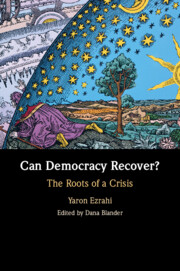Book contents
- Can Democracy Recover?
- Can Democracy Recover?
- Copyright page
- Dedication
- Contents
- Preface
- Words from the Author
- Introduction
- Part I The Rise of Western Politics following the Collapse of the Monistic Medieval Cosmology
- Part II The Emergence of the Epistemological Constitution of Modern Democracy
- Part III The Dialectics of Objectification
- 9 The Objectifying Gaze of Science and Technology in the Political Context
- 10 Economics as Politics by Other Means
- 11 The Virtual Objectification of the Law
- Part IV The Erosion of the Epistemological Constitution of Modern Democracy
- Part V Democracy beyond Modernity
- Can Democracy Recover? Concluding Reflections
- Epilogue
- Index
9 - The Objectifying Gaze of Science and Technology in the Political Context
from Part III - The Dialectics of Objectification
Published online by Cambridge University Press: 02 January 2025
- Can Democracy Recover?
- Can Democracy Recover?
- Copyright page
- Dedication
- Contents
- Preface
- Words from the Author
- Introduction
- Part I The Rise of Western Politics following the Collapse of the Monistic Medieval Cosmology
- Part II The Emergence of the Epistemological Constitution of Modern Democracy
- Part III The Dialectics of Objectification
- 9 The Objectifying Gaze of Science and Technology in the Political Context
- 10 Economics as Politics by Other Means
- 11 The Virtual Objectification of the Law
- Part IV The Erosion of the Epistemological Constitution of Modern Democracy
- Part V Democracy beyond Modernity
- Can Democracy Recover? Concluding Reflections
- Epilogue
- Index
Summary
This chapter explores the impact of science and technology’s objectifying gaze on society, Culture, and politics throughout history. It discusses how this gaze has turned the world into an object and humans into observers, diminishing moral, psychological, and political aspects. The chapter analyzes the duality of objectification, which renders man-made objects external despite embodying human values and actions. It examines the Industrial Revolution as a pivotal historical context where technology was seen as a mark of progress and an embodiment of objective Nature. Eventually, the human choices and interests behind technology were exposed, leading to the reconsideration of technologies from ethical, economic, political, and aesthetic viewpoints. The chapter also points to the ambivalence surrounding technology, including both fear and admiration, and how the disillusionment with technology has impacted the democratic epistemological framework. Additionally, it discusses the influence of philosophers-scientists like Descartes and Newton on modern dualistic cosmology, highlighting how science and technology have shaped various socio-political fields such as law, medicine, economics, and political science.
- Type
- Chapter
- Information
- Can Democracy Recover?The Roots of a Crisis, pp. 93 - 99Publisher: Cambridge University PressPrint publication year: 2025

